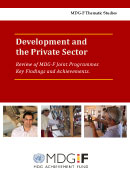

Development and the Private Sector
 Eradicate Extreme Poverty and Hunger
Eradicate Extreme Poverty and Hunger
Private sector and development efforts are about economic growth as a means to human development.
Poverty in its many dimensions persists stubbornly worldwide, not just in pockets, but in extensive areas. The private sector can play a role in efforts to reduce poverty, but, in order to be effective, interventions need to be multi-targeted in approach and engage multiple partners.
The MDG-F’s 12 programmes encouraged the development of pro-poor growth policies that increase the participation and benefits of the poor in private sector development, particularly women. Interventions bolstered economic sectors where the poor are strongly represented, opened markets to improve access and supported small and medium enterprises.
The programmes operated in five areas -- innovation, investment, capacity building, partnerships and advocacy -- and supported pro-poor business in some of the poorest regions and with vulnerable groups often suffering multiple dimensions of poverty, including women, youth, ethnic minorities and indigenous communities.
Among many achievements, the programmes produced increased net income and employment for poor households. In Cuba, producers increased their sales to state produce markets by 68% for beans and by 55% for rice. In Serbian rural municipalities, visitor numbers and off-farm income increased 20-25%. A single farmer in Upper Egypt saw his revenue increase 30% and was able to generate 14 jobs by accessing a new market of urban consumers for his fresh tomatoes. And in Vietnam, the indigenous weavers cooperative Vong Ngan won a VND 300 million contract by participating in the October 2012 Hanoi Gift Show with MDG-F support.
These efforts contribute to achieving the MDG 1 goal of eradicating extreme poverty by halving between 1990 and 2015 the proportion of people whose income is less than $1.25 a day.
RESULTS OF OUR WORK:
- Technical assistance services reached 21,500 farmers, entrepreneurs and small businesses.
- Nearly 160 new instruments were created to support private sector and development initiatives, including 11 national laws, 100 national and local strategies and 48 national and local policies.
- 85 cooperatives and 182 farmers associations were created or strengthened.
Click here for a complete report of the indicators and results achieved by the MDG-F’s 12 joint programmes on Development and the Private Sector.
Success Stories

Analysis of key findings and achievements
This report captures the main achievements and experiences of the MDG-F’s programmes in this thematic window and presents their impact on the lives of communities across five regions. Prepared by an independent expert, the study is based on extensive desk reviews, interviews with selected joint programmes, and a thorough analysis and synthesis of inputs and contributions.
| Download Summary | Download Full Report |
|
Joint Programme Title
Country
MDG-F Programme Area
|
